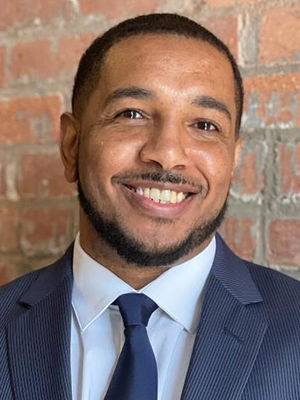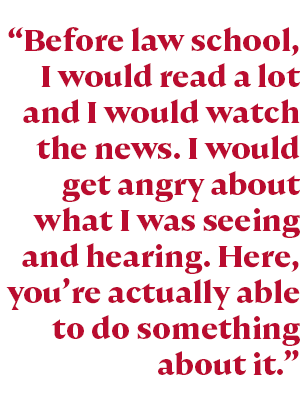Crist Whitney: Artist & Advocate
Sitting across from Crist Whitney, JD’21, in Rathod Mohamedbhai’s Five Points office, you can almost hear each refrain of his opera. You can understand the musicality of his rap albums. You can see each scene of his novel and experience each act of his screenplay. You can feel how deeply he cares about his work at this firm. No matter where he is or what he does, Whitney is passionate. A passionate lawyer and a passionate creative.
When asked how creativity influences his legal practice, Whitney shared: “Law is a lot about writing, a lot about thinking. As an artist, it’s the same thing. Oftentimes you’re staring at a blank page. You have to know your starting point and your end point, and how to put everything together.”
“I can hear a certain story and then think about how to craft that story. That’s a lot of what we do. We’re storytellers.”
The Starting Point
It’s hard to pinpoint where Whitney got his start. His start at what? His music career? His screenwriting? His legal practice? It seems that, rather than being discrete accomplishments, each of his achievements contribute to the entirety of who Whitney is as a person and a leader in the community.
That said, Whitney’s start could be traced back to his mother, who once told him that “there’s nothing worse than a foolish man” – an aphorism that Whitney took to heart.
“When I was a kid, it made me read more. I didn’t want to grow up and be someone foolish.”
Instead of growing up and becoming foolish, Whitney worked in retail, sales, education, government, politics, and the music industry. He wrote a hip-hop novel (“imagine ‘Purple Rain’ or ‘8 Mile’”) and a political thriller (whose protagonist is, fittingly, a law student). He recorded several rap albums. He wrote an opera about the 1965 Watts Rebellion (but with a Motown sound). He was commissioned to write an urban crime drama screenplay, which recently finished production.
Whitney also studied political science and history at CU Denver and planned to attend their Ph.D. program. He wanted to become a history professor. But then, just before 1L orientation, Whitney learned that he had been admitted to the Sturm College of Law. He promptly disenrolled from the Ph.D. program, purchased his case books, and began a three-year journey.
That decision was transformational.
Putting Everything Together
Whitney credits an externship with Judge Kato Crews and the law school’s Criminal Defense Clinic as being pivotal to his growth and development as a future lawyer.
“My externship with Judge Crews was an amazing experience. He knew exactly how to talk to me. He really, really helped my confidence.” Whitney also recalls receiving meaningful advice from Judge Crews about being a Black attorney and understanding the importance of being seen. Years later, Whitney can recite Judge Crews’ advice word-for-word, advice that is clearly foundational to Whitney’s legal practice and community involvement .
Also foundational: a show-cause argument his 3L year.
“I was nervous going in. It was my first time in court. I overprepared, and I had to craft this story. That, to me, was one of the more interesting parts.”
“I had it memorized, and while I was delivering it, I thought, wow, this sounds amazing. The judge actually told me ‘that’s a great argument, Counselor,’ and asked about my time as a Student Attorney. And then he went to the professors and said ‘you guys are doing a great job.’ That was very fulfilling.”
Not only was it fulfilling on a personal level, Whitney also recalls the joy associated with being able to help his first client.
“There were real stakes. Real clients. That was something that I found very rewarding about that experience.”
It’s also something that he finds rewarding about his current experience at Rathod Mohamedbhai, a Denver based, minority owned law firm specializing in Civil Rights law.
“Before law school, I would read a lot and I would watch the news. I would get angry about what I was seeing and hearing. Here, you’re actually able to do something about it. Even if slow, change does eventually come, and bad actors are held accountable.”
Whitney glances to the painting by Christian Glass hanging in the conference room.
“Certain things that we see are demoralizing. It’s very sad, and it feels like nothing’s changing. But we have to just keep doing that work.” What keeps him going, in reflecting on the work at Rathod Mohamedbhai, is that “the success rate here is pretty profound.”
The End Point
How does Whitney define success?
“When I was younger, being rich and famous.” Whitney smiles. “I was an artist. That would have been the measure for success – as a hip-hop artist, you’re successful when you’re rich and famous and when you create a quality product.”
“As I got older, it changed. Success is more about feeling free, feeling fulfilled in what you do. Success isn’t only about accomplishments, it’s also about the people you touch. It’s about feeling good about what you’re doing.”
To Whitney, being at Rathod Mohamedbhai epitomizes his definition of success.
“I’ve landed in a place where I’m very fortunate to be. I work with some of the smartest people I’ve ever been around. There’s a level of comfort – just being around and being able to soak in the information. I would say that’s the art of success.”
It’s also the art of Whitney’s own story arc.
“My whole life has been about me. I think it is very refreshing that what I do now is not all about me.”
Crist Whitney, JD’21 (l) and Qusair Mohamedbhai with the 2024 Champion of Justice Award presented to Rathod Mohamedbhai LLC by the Colorado Association of Black Journalists.
To view the article in it’s entirety, visit www.law.du.edu.


